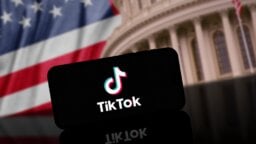The US government has asked the court to reject TikTok’s emergency request to delay a law that could ban the app in the US unless its Chinese owners sell the platform by January 19.
A federal appeals court rejected TikTok’s lawsuit challenging the law last Friday (December 6). TikTok has said it will appeal the decision in the Supreme Court.
On Monday (December 9) TikTok and its parent company ByteDance filed an emergency motion asking for a temporary injunction to delay the law, arguing that “the Supreme Court should have an opportunity, as the only court with appellate jurisdiction over this action, to decide whether to review this exceptionally important case”.
The Protecting Americans from Foreign Adversary Controlled Applications Act, signed into law by President Joe Biden in April 2024, targets apps owned by companies in countries the US considers security risks, including China, Iran, and Russia. The law specifically names TikTok as a threat. To continue operating in the US, ByteDance must sell the app or face restrictions by January 19, 2025.
Lawmakers argue TikTok could give the Chinese government access to sensitive user data or allow it to manipulate content seen by Americans. TikTok, which has over 170 million users in the US, denies these claims and says it does not share data with the Chinese government.
If the Supreme Court doesn’t intervene, and if ByteDance doesn’t sell the platform by January 19, app stores will have to stop offering TikTok in the US, and updates to the app will be blocked starting January 19, 2025. While current users may still access the app initially, it could stop working over time. TikTok’s parent company ByteDance has previously asserted that it has no plans to sell the app.
In Monday’s emergency motion filed by TikTok and ByteDance, which you can read in full here, they suggested there is a reasonable chance the incoming Trump administration could pause enforcement of the law or soften its most severe impacts. The President-elect has promised to stop the app from being banned when he takes office.
According to TikTok’s motion, “an injunction is especially appropriate because it will give the incoming Administration time to determine its position — which could moot both the impending harms and the need for Supreme Court review”.
In its response to the motion, filed on Thursday (December 11), the US Justice Department urged the court to deny ByteDance and TikTok’s motion to delay the law, arguing that they “offer no valid reason to pretermit the Supreme Court’s prerogative to decide how proceedings before that Court should play out”.
The filing also expressed the government’s concerns about the potential length of the requested delay to enforcing the law, arguing that could be “open-ended” because TikTok hasn’t committed to a timeline.
According to Thursday’s filing from the US government: “At an absolute minimum, this Court should reject petitioners’ request for an open-ended injunction pending Supreme Court review, under which petitioners might delay seeking such review for months and thus effectively pretermit the Supreme Court’s ability to hear and decide any future case this Term.
Added the filing: “Indeed, TikTok suggests that if it receives an injunction from this Court, it would not intend to file any petition for certiorari in the Supreme Court until it determines — seemingly following the forthcoming change in Administrations and perhaps additional months of non-litigation efforts.”
“As the Court has already held, the Act’s prohibitions are tailored to advance compelling national-security interests. As explained, any delay in those prohibitions that goes beyond what Congress determined was appropriate would be unwarranted. And the indefinite delay contemplated by petitioners—potentially for more than a year if Supreme Court review is delayed until the next Term — would be especially deleterious to the government’s and the public’s interests in enforcing the Act.”
The filing suggests that if the court were “inclined to grant” TikTok’s request, any injunction should be under the condition that TikTok and ByteDance would have to file a petition with the Supreme Court within seven days, “which would allow the Supreme Court, if it chooses, to expedite consideration of the case and permit a decision during this Term”.
In its statement published on its website on Monday, TikTok claimed that in 2023 alone, the advertising, marketing, and organic reach on TikTok contributed $24.2 billion, and TikTok’s own operations contributed an additional $8.5 billion to the US GDP.
TikTok cites “estimates [that] show that small businesses on TikTok would lose more than $1 billion in revenue and creators would suffer almost $300 million in lost earnings in just one month unless the TikTok Ban is halted”
The Supreme Court’s review of the case will be closely watched. The outcome will establish a major precedent for how the US handles foreign-owned technology companies.Music Business Worldwide





